复习Unit2.2八年级英语下册第二单元复习第二课时
八年级英语下册教案:Unit 2 I’ll help to clean up the city
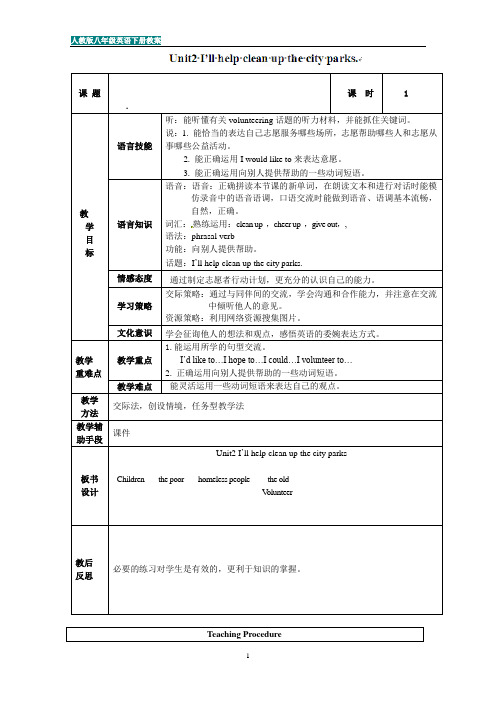
课题.课时 1教学目标语言技能听:能听懂有关volunteering话题的听力材料,并能抓住关键词。
说:1. 能恰当的表达自己志愿服务哪些场所,志愿帮助哪些人和志愿从事哪些公益活动。
2. 能正确运用I would like to来表达意愿。
3. 能正确运用向别人提供帮助的一些动词短语。
语言知识语音:语音:正确拼读本节课的新单词,在朗读文本和进行对话时能模仿录音中的语音语调,口语交流时能做到语音、语调基本流畅,自然,正确。
词汇:熟练运用:clean up ,cheer up ,give out,,语法:phrasal verb功能:向别人提供帮助。
话题:I’ll help clean up the city parks.情感态度通过制定志愿者行动计划,更充分的认识自己的能力。
学习策略交际策略:通过与同伴间的交流,学会沟通和合作能力,并注意在交流中倾听他人的意见。
资源策略:利用网络资源搜集图片。
文化意识学会征询他人的想法和观点,感悟英语的委婉表达方式。
教学重难点教学重点1.能运用所学的句型交流。
I’d like to…I hope to…I could…I volunteer to…2. 正确运用向别人提供帮助的一些动词短语。
教学难点能灵活运用一些动词短语来表达自己的观点。
教学方法交际法,创设情境,任务型教学法教学辅助手段课件板书设计Unit2 I’ll help clean up the city parksChildren the poor homeless people the oldV olunteer教后反思必要的练习对学生是有效的,更利于知识的掌握。
Teaching ProcedureStages/TimingTeachet ers’ activities Students’ activities MethodologyStep 1 Warming upStep 2 lead-inStep 3 practice T: Could you please help me close thedoor?Could you please help me open thewindow?Thanks for your help.Do you know there is a special day inDecember. On that day, many peoplewo uld like to help others who need help.Do you know when is it and what day is itthat day?Introduction of “International V olunteerDay”Time: December 5th.They give people help without hope ofrewardLet’s enjoy some pictures.Show some pictures.They help to sent food to the poor people.They help to examine the health conditionof the old.They help to cut the hair of the poor.They help to clean the yards of thecommunity.They help to clean the bus-stop.What else could we do to help people?Show some other pictures.I’d like to/I hope to/I could/I volunteerto:help children with their schoolwork.visit the old in an old people’s home.help watch the traffic.give our old boo ks to “Hope School”.cheer up sick kids in the hospital.…1a. Look at the ways y ou could helppeople in thepicture. Then list other ways.Other ways you could help people___________________________________________________________________________________________________Ss do it.Ss think about it.Ss: They help to sentfood to the poorpeople.They help toexamine the healthcondition of the old.They help to cut thehair of the poor.They help to cleanthe yards of thecommunity.They help to cleanthe bus-stop.What else could wedo to help people?Ss: I’d like to/Ihope to/I could/Ivol unteer to:Ss do 1a.复习,进一步巩固落实。
八下英语第二单元知识点归纳

八下英语第二单元知识点归纳In the second unit of the eighth grade English textbook, students are introduced to a variety of knowledge pointsthat are essential for their language learning and understanding. One of the key knowledge points is the useof the past continuous tense, which is a fundamental aspect of English grammar. This tense is used to describe actions that were ongoing in the past at a specific point in time, and it is important for students to understand how to form and use this tense correctly in order to communicate effectively in English.Another important knowledge point in this unit is the use of adjectives to describe people and things. Adjectives are essential for adding detail and depth to descriptions, and students are taught how to use them effectively to convey specific qualities and characteristics. Understanding how to use adjectives correctly is crucialfor students to be able to express themselves clearly and accurately in English.Additionally, students are introduced to the concept of direct and indirect speech in this unit. Direct speech involves quoting the exact words spoken by someone, while indirect speech involves reporting what someone saidwithout quoting their exact words. This distinction is important for students to understand, as it affects howthey convey information and communicate in different contexts.Furthermore, students learn about the use of modalverbs in this unit. Modal verbs are used to express necessity, possibility, ability, permission, and obligation, and they play a crucial role in conveying different meanings and nuances in English. It is important for students to understand how to use modal verbs correctly in order to communicate effectively and accurately in various situations.Moreover, students are taught about the use of prepositions in this unit. Prepositions are words that show the relationship between a noun or pronoun and other wordsin a sentence, and they are essential for indicating location, time, and direction. Understanding how to use prepositions correctly is crucial for students to be able to construct meaningful and coherent sentences in English.Lastly, students are introduced to the concept of reported speech in this unit. Reported speech involves reporting what someone else has said, and it is important for students to understand how to change the tense, pronouns, and other words when converting direct speech into reported speech. This knowledge is essential for students to be able to accurately convey information and communicate effectively in English.In conclusion, the second unit of the eighth grade English textbook covers a wide range of knowledge points that are essential for students to master in order to develop their language skills. From understanding the past continuous tense to using adjectives, modal verbs, prepositions, and reported speech, students are equipped with the fundamental tools they need to communicate effectively and accurately in English. Mastering theseknowledge points is crucial for students to be able to express themselves clearly and confidently in both spoken and written English.。
第二课时外研版英语八年级下册Module7Unit2教学设计
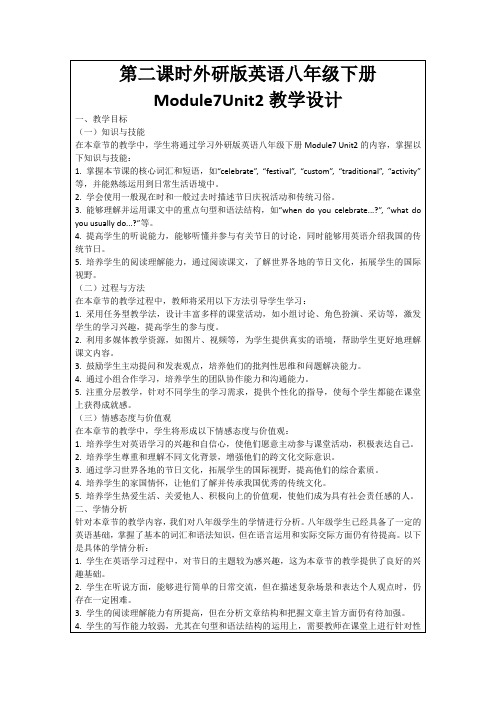
7.教学中注重情感教育,引导学生尊重和理解不同文化背景,培养他们的跨文化交际意识。
8.结合教材内容,适时融入德育教育,培养学生热爱生活、关爱他人、积极向上的价值观。
3.阅读作业:阅读一篇关于世界各地节日的英文文章,完成相关练习,如填空、判断正误、回答问题等。要求学生在阅读过程中,注重文章结构和主旨大意的把握,提高阅读理解能力。
4.听力作业:听一段关于节日庆祝活动的英语对话,完成相关练习。培养学生关注细节、获取关键信息的听力技巧。
5.课后实践活动:了解并收集我国一个传统节日的资料,包括节日的起源、习俗、活动等,以PPT或手抄报的形式呈现。在下一节课上,与同学们分享你的成果,增进对传统文化的了解和传承。
2.俗。
3.能够理解并运用课文中的重点句型和语法结构,如“when do you celebrate...?”, “what do you usually do...?”等。
4.提高学生的听说能力,能够听懂并参与有关节日的讨论,同时能够用英语介绍我国的传统节日。
3.针对写作难点,设计梯度性的写作任务,让学生从仿写、改写等简单任务逐步过渡到独立创作。在写作过程中,教师给予针对性的指导,帮助学生运用所学知识,提高写作能力。
4.利用课堂小组合作学习,促进学生之间的互动交流,培养学生的团队协作能力和语言表达能力。
5.教学过程中,关注学生的个体差异,实施分层教学。针对不同学生的学习需求,提供个性化的指导,使每个学生都能在课堂上获得成就感。
四、教学内容与过程
(一)导入新课
1.教师通过展示世界各国庆祝节日的图片和视频,引导学生关注不同文化背景下的节日庆典,激发学生对本节课的兴趣。
Module+12+Unit+2第二课时课件 外研版八年级英语上册
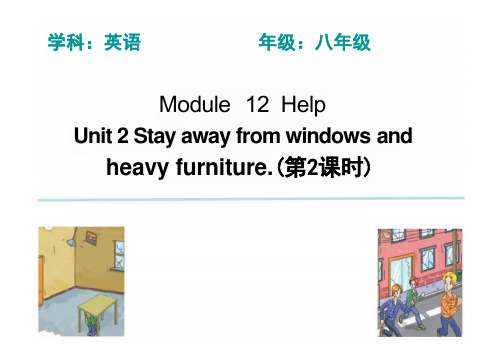
2.警告某人某事
3.during an earthquake
3.在地震期间
4.jump out of high buildings 4.从高楼跳出去
5.hide under a table
5.藏在桌子下面
6.stay away from 7.keep clear of fires
6.远离 7.不接触火
警告;告诫v.
earthquake
Warn
/'IN:saId/ /'ʌndə/
在里面;向室内 adv. inside
在……里面 prep.
里面的;内部的adj.
在 … … 正下方; prep. under 在….…下面
/ki:p/
保持;留在 v.
keep
/'wIndəu/
/klio/
/ka:m/
/breIV/ /'helpfl/ /'pavə /
hotel warned me aboutthe weather.
Language points
warn sb.to do sth.意为“警告某人去做某事”; warn sb.not to dosth.意为“警告某人不要做某事”。
如:
老师经常告诫我们车辆拥挤的路上要当心。
The teacher often warns US to be careful in heavy traffic.
In short,follow what you learnt in school.You can be safe and you can also help save others.
Try to remember them.
1.it's difficult to do sth
2020年春牛津译林版英语八年级下册— Unit2知识点梳理

Unit 2 Travelling2.1 Comic strip & Welcome to the unit1. fantasticadj.意为“极好的,美妙的”。
have a fantastic time=have a good/great/wonderful time玩得开心。
fantasy n.幻想,想象。
2. such det.& pron.such意为“这样的(人或物)”,常用于以下结构:such+a/an+adj.+可数名词单数。
如:This is such a big house.这是一座如此大的房子。
such+adj.+可数名词复数。
如:They are such kind girls.她们是如此好心的女孩。
such+adj.+不可数名词。
如:It is such sad music.它是如此悲伤的音乐。
【辨析】so常用于以下结构:so+adj.+a/an+可数名词单数。
如:so clever a boy如此聪明的一个男孩so+adj./adv.。
如:so clever如此聪明;so quickly如此迅速so many/much/few/little+n.。
如:so many mistakes如此多的错误3. couple n.意为“两人,两件事物,几个人”。
a couple of…一对,几个,几件。
I saw a couple of men get out我看见有两个男人出去了。
We went there a couple of years ago.我们几年前去过那儿。
4. --- Hey, Eddie.Where are you going? 嘿,埃迪。
你要去哪儿?---I'm going to South Hill for my holiday.我要去南山度假。
这两句都表示将要做某事,一般用将来时态,但因为句中的动词是go,所以可用现在进行时表示将来的概念。
8年级下册英语导学案Unit2

学校:班级:小组:姓名:小组评价:教师评价:Unit 2 I’ll help to clean up the city parks.第一课时 Section A(1a-1c)【学习目标】1.会使用重点单词cheer,volunteer...,重点短语clean up,cheer up,give out...2.会使用“I could...”、“I hope to...”等句型,向别人提供协助。
3.能听懂、能说出“协助他人,参加社会公益活动”的相关话题。
【学习重难点】1.掌握cheer,volunteer...,clean up,cheer up,give out...的用法。
2.用重要句型向别人提供协助。
【学法指导】1.查词汇表,自学本课时新词汇。
2.朗读1b,勾画有用的表达:clean up,cheer up,give out,at the food bank3.互助学习,练习对话。
【自学互助】一.温故知新:和同伴议一议,讨论回答以下问题。
1.Do you think helping other is great?2.What will you do if you are a volunteer? Please give some examples.二.翻译以下短语。
1.清扫__________2.分发___________3.使快乐;振奋____________________4.sick children________________5.at the food bank__________________6.after-school study program______________________三.通过互助学习后,我的疑惑是_____________________________________________________________________________ 【展示互导】看图说,仔细听,认真评通过观察1a图片中你能够协助人们的方式,然后列出更多其他方式。
八年级英语下册电子课本
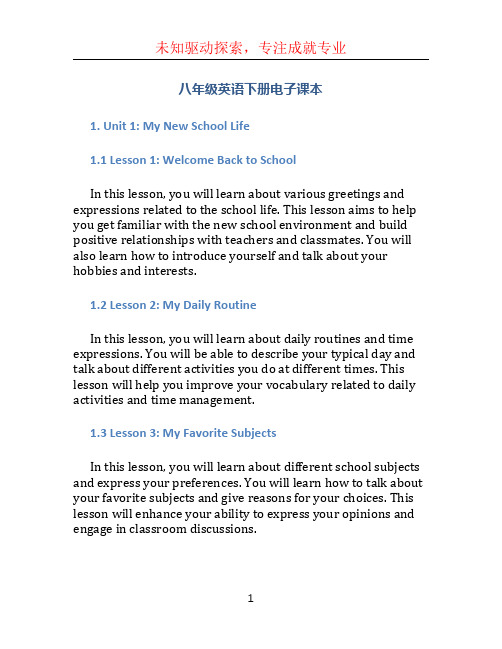
八年级英语下册电子课本1. Unit 1: My New School Life1.1 Lesson 1: Welcome Back to SchoolIn this lesson, you will learn about various greetings and expressions related to the school life. This lesson aims to help you get familiar with the new school environment and build positive relationships with teachers and classmates. You will also learn how to introduce yourself and talk about your hobbies and interests.1.2 Lesson 2: My Daily RoutineIn this lesson, you will learn about daily routines and time expressions. You will be able to describe your typical day and talk about different activities you do at different times. This lesson will help you improve your vocabulary related to daily activities and time management.1.3 Lesson 3: My Favorite SubjectsIn this lesson, you will learn about different school subjects and express your preferences. You will learn how to talk about your favorite subjects and give reasons for your choices. This lesson will enhance your ability to express your opinions and engage in classroom discussions.2. Unit 2: Healthy Habits2.1 Lesson 1: Eating RightIn this lesson, you will learn about healthy eating habits and the importance of a balanced diet. You will learn about different food groups and their nutritional value. This lesson aims to promote a healthy lifestyle and help you make better food choices.2.2 Lesson 2: Staying ActiveIn this lesson, you will learn about the benefits of regular physical activity and different ways to stay active. You will also learn about different sports and recreational activities. This lesson intends to encourage you to engage in regular exercise and lead an active life.2.3 Lesson 3: Mental Well-beingIn this lesson, you will learn about the importance of mental well-being and various strategies to maintain a healthy mind. You will learn about stress management techniques and the significance of relaxation and mindfulness. This lesson aims to promote holistic health and well-being.3. Unit 3: Travel and Adventure3.1 Lesson 1: Experiencing CulturesIn this lesson, you will learn about different cultures and the importance of respecting cultural diversity. You will learnabout customs, traditions, and cuisines of different countries. This lesson aims to broaden your horizons and promote cultural sensitivity.3.2 Lesson 2: Planning a TripIn this lesson, you will learn about the process of planning a trip and different aspects to consider, such as transportation, accommodation, and itinerary. You will also learn how to ask for and give directions. This lesson intends to develop your problem-solving and decision-making skills.3.3 Lesson 3: Outdoor AdventuresIn this lesson, you will learn about different outdoor activities and adventures. You will learn about camping, hiking, and other recreational activities. This lesson aims to promote an appreciation for nature and develop your teamwork and leadership skills.4. Unit 4: Technology and the Future4.1 Lesson 1: Technological AdvancementsIn this lesson, you will learn about technological advancements and their impact on society and daily life. You will learn about different gadgets and devices and how they have revolutionized various industries. This lesson aims to develop your technological literacy and critical thinking skills.4.2 Lesson 2: Social Media and CommunicationIn this lesson, you will learn about different social media platforms and their role in communication. You will learn about the pros and cons of social media and how to use it responsibly. This lesson intends to enhance your digital citizenship and online safety awareness.4.3 Lesson 3: The Future of WorkIn this lesson, you will learn about the future of work and how it is changing due to technological advancements. You will learn about different careers and skills that will be in demand in the future. This lesson aims to prepare you for the changing job market and develop your career planning skills.This is just a sample outline for the eighth-grade English textbook for the second semester. Each lesson can be further expanded with additional content, such as vocabulary exercises, reading passages, listening activities, and grammar practice. The textbook should also include interactive elements, such as videos, online resources, and quizzes, to engage students and enhance their learning experience.。
八年级下册英语第2单元笔记
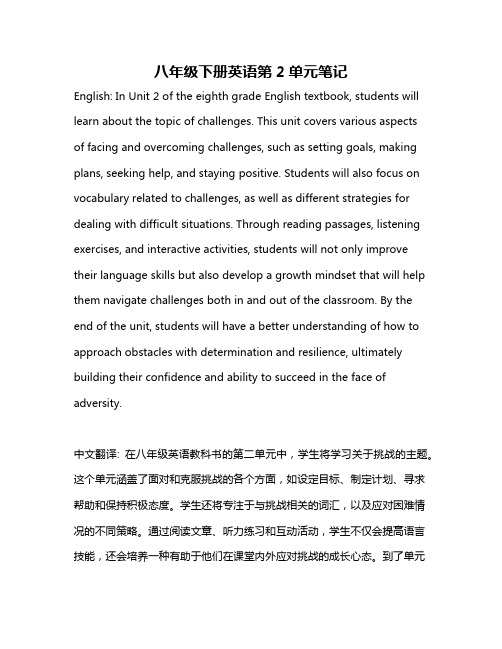
八年级下册英语第2单元笔记English: In Unit 2 of the eighth grade English textbook, students will learn about the topic of challenges. This unit covers various aspectsof facing and overcoming challenges, such as setting goals, making plans, seeking help, and staying positive. Students will also focus on vocabulary related to challenges, as well as different strategies for dealing with difficult situations. Through reading passages, listening exercises, and interactive activities, students will not only improve their language skills but also develop a growth mindset that will help them navigate challenges both in and out of the classroom. By the end of the unit, students will have a better understanding of how to approach obstacles with determination and resilience, ultimately building their confidence and ability to succeed in the face of adversity.中文翻译: 在八年级英语教科书的第二单元中,学生将学习关于挑战的主题。
八下英语二单元知识点

八下英语二单元知识点八年级下册英语第二单元主要围绕着“日常活动”这一主题展开,涉及了学生们在学校和家中进行的各种活动,包括学习、运动、娱乐等。
以下是本单元的重点知识点详解,帮助同学们更好地掌握和运用所学知识。
一、重点词汇日常活动类词汇:study(学习)、play(玩耍)、eat(吃)、sleep(睡觉)、wash(洗漱)、shop (购物)等。
学校生活相关词汇:class(课程)、homework(作业)、test(考试)、library(图书馆)、playground (操场)等。
运动类词汇:swim(游泳)、play tennis(打网球)、ride a bike(骑自行车)、climb mountains (爬山)等。
频度副词:always(总是)、usually(通常)、often(经常)、sometimes(有时)、never(从不)等。
二、重点短语日常活动短语:go to the movies(去看电影)、go shopping(去购物)、play computer games (玩电脑游戏)、do housework(做家务)等。
学校生活短语:have a test(参加考试)、go to the library(去图书馆)、play sports(做运动)、after-school activities(课后活动)等。
运动类短语:play tennis with sb.(和某人一起打网球)、go swimming(去游泳)、ride a bike to school(骑自行车上学)等。
三、重点句型询问某人通常做什么活动的句型:What do you usually do on weekends? 你周末通常做什么?描述某人一周内活动安排的句型:On Monday, I usually ... 周一我通常……;On the weekend, I sometimes ... 周末我有时……使用频度副词谈论日常活动的句型:I always get up at 6:30 in the morning. 我总是早上6:30起床。
人教版八年级英语下册第二单元第二课时

八年级英语(下)第2单元第2课时Unit 2 I’ll help to clean up the city parks.Section A 3a—3c一、【教材分析】教学目标知识目标1.学习并掌握新词汇:several; strong; feeling; satisfaction; joy; owner; try out; journey2. 能正确使用以下常用表达:try out3. 学会使用以下句型:1)…give up several hours each week to help others.2)He volunteers at an animal hospital every Saturday morning.3) I get such a strong feeling of satisfaction when I see the animals get better and the look of joy ontheir owner s’ faces.4)Last year, she decided to try out for a volunteer after-school reading program.5) The ki ds are sitting in the library, but you can see in their eyes that they’re going on a differentjourney with each new book.能力目标通过阅读训练,培养学生的良好的阅读理解能力,同时使学生在理解故事情节的基础上对文章进行进一步的解读,以实现对学生进行有利的情感教育的目的。
情感目标通过本课的学习,培养学生乐于助人、志愿服务的精神,同时也要树立自我保护意识。
教学重点重点词汇、常用表达及句型。
教学难点在理解故事情节的基础上对文章进行进一步的解读。
教学方法情景教学法;任务型教学法。
人教版英语八年级下册 Unit2_SectionB(2a-2e)教案
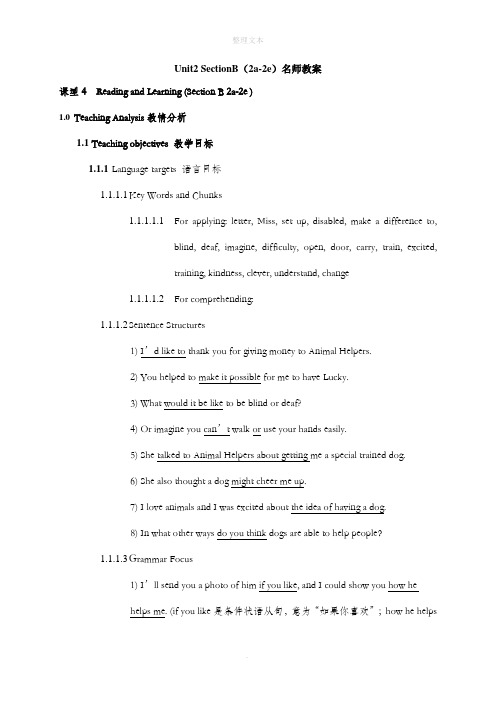
Unit2 SectionB(2a-2e)名师教案课型4 Reading and Learning (Section B 2a-2e )1.0Teaching Analysis教情分析1.1Teaching objectives 教学目标1.1.1Language targets 语言目标1.1.1.1Key Words and Chunks1.1.1.1.1For applying: letter, Miss, set up, disabled, make a difference to,blind, deaf, imagine, difficulty, open, door, carry, train, excited,training, kindness, clever, understand, change1.1.1.1.2For comprehending:1.1.1.2Sentence Structures1) I’d like to thank you for giving money to Animal Helpers.2) You helped to make it possible for me to have Lucky.3) What would it be like to be blind or deaf?4) Or imagine you can’t walk or use your hands easily.5) She talked to Animal Helpers about getting me a special trained dog.6) She also thought a dog might cheer me up.7) I love animals and I was excited about the idea of having a dog.8) In what other ways do you think dogs are able to help people?1.1.1.3Grammar Focus1) I’ll send you a photo of him if you like, and I could show you how hehelps me. (if you like是条件状语从句,意为“如果你喜欢”;how he helpsme是宾语从句,意为“他如何帮助我”)2) I’m su re you know that this group was set up to help disabled people likeme. (was set up是一般过去式的被动语态,一般过去时的被动语态的结构为“was/were+动词过去分词”)1.1.2Ability goals 能力目标1.1.2.1帮助学生通过单词的词性来帮助理解单词在句中的含义。
人教版八年级英语下册Unit 2 复习小练

人教版八年级英语下册Unit 2 复习小练1.用方框内所给词组的适当形式填空。
1.He has a lot of work to do, so he has to going to the doctor.2. Could you help me these new books?3. Don't worry. I'll help_ __your room.4. Let's_ _the sick kids in the hospital.5. In the end, Grandma___ __ a good idea.6. Would you please not signs here?7.We're going to__ _a food bank to help bungry people.8.I'll___ __you _as soon as I come back.Ⅱ.根据句意,用括号中所给单词的适当形式填空。
9. Let's cheer _( they ) up,OK?10.r'd like ( visit ) my English teacher tomorrow.11. She risked her own life to help a (able) woman.12. Will you be able ( come )?13.They plan ( buy) a big house.14.I feel good about ( volunteer) at the old people's home.15.Not only you but also he ( have) to have a meeting today.16. You could help the teacher ( train ) a monner tram.17.They volunteer their spare time (help) others.18. I spent a lot of time__ __( do) my homework last weekend. Ⅲ.按要求完成句子。
八下英语第二单元知识点

八下英语第二单元知识点In the second unit of eighth grade English, studentsare introduced to a variety of new knowledge points thatare essential for their language learning journey. These knowledge points cover a range of topics including grammar, vocabulary, reading comprehension, and writing skills. Itis crucial for students to grasp these concepts in order to build a strong foundation in English language andliterature.One of the key knowledge points in this unit is grammar. Students will learn about different parts of speech, suchas nouns, pronouns, verbs, adjectives, adverbs, prepositions, conjunctions, and interjections. Understanding the role of each part of speech in a sentence is fundamental for constructing grammatically correct and coherent sentences. This knowledge also helps students to analyze and understand the structure of sentences in both their reading and writing.Vocabulary is another important aspect of language learning covered in this unit. Students will be introduced to new words and phrases, and they will learn how to use context clues to determine the meaning of unfamiliar words. Building a strong vocabulary is essential for effective communication and comprehension. It also allows students to express themselves more precisely and eloquently in both spoken and written forms of language.In addition to grammar and vocabulary, reading comprehension is a crucial skill that students will develop in this unit. They will learn strategies for understanding and analyzing texts, as well as how to identify main ideas, supporting details, and inferences. These skills are essential for students to become proficient readers who can comprehend and interpret a wide range of texts, from literature to informational articles.Writing skills are also a focus in this unit. Students will learn about different types of writing, such as narrative, descriptive, expository, and persuasive. They will also learn about the writing process, includingprewriting, drafting, revising, editing, and publishing. Developing strong writing skills is essential for effective communication and for expressing one's thoughts and ideas clearly and persuasively.Moreover, this unit also emphasizes the importance of critical thinking and analysis. Students will learn how to evaluate and critique texts, as well as how to form and support their own opinions with evidence and reasoning. These skills are essential for students to become independent and critical thinkers who can engage with complex ideas and arguments.Overall, the knowledge points covered in the secondunit of eighth grade English are crucial for students' language learning and literacy development. By mastering these concepts, students will be well-equipped to communicate effectively, comprehend a wide range of texts, and express their thoughts and ideas with clarity and confidence. This unit lays the foundation for students to become proficient and thoughtful users of the Englishlanguage, which is essential for their academic and professional success.。
初中英语人教新目标八年级下册Unit 2 Section A预习指导(知识点+练习题)
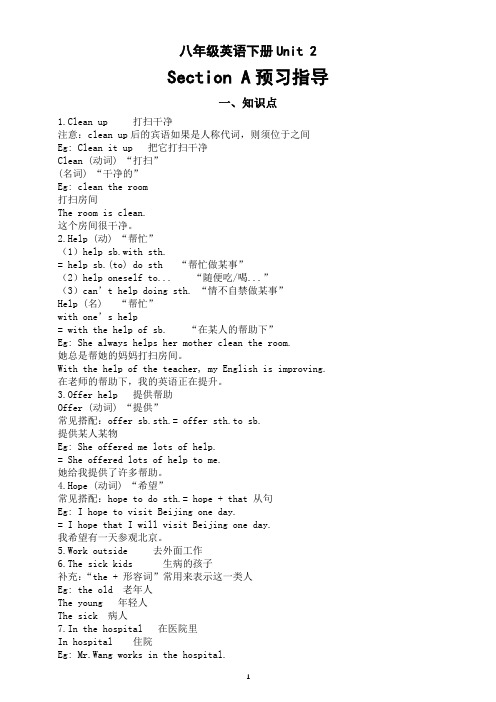
八年级英语下册Unit 2Section A预习指导一、知识点1.Clean up 打扫干净注意:clean up后的宾语如果是人称代词,则须位于之间Eg: Clean it up 把它打扫干净Clean (动词) “打扫”(名词) “干净的”Eg: clean the room打扫房间The room is clean.这个房间很干净。
2.Help (动) “帮忙”(1)help sb.with sth.= help sb.(to) do sth “帮忙做某事”(2)help oneself to... “随便吃/喝...”(3)can’t help doing sth. “情不自禁做某事”Help (名) “帮忙”with one’s help= with the help of sb. “在某人的帮助下”Eg: She always helps her mother clean the room.她总是帮她的妈妈打扫房间。
With the help of the teacher, my English is improving. 在老师的帮助下,我的英语正在提升。
3.Offer help 提供帮助Offer (动词) “提供”常见搭配:offer sb.sth.= offer sth.to sb.提供某人某物Eg: She offered me lots of help.= She offered lots of help to me.她给我提供了许多帮助。
4.Hope (动词) “希望”常见搭配:hope to do sth.= hope + that 从句Eg: I hope to visit Beijing one day.= I hope that I will visit Beijing one day.我希望有一天参观北京。
5.Work outside 去外面工作6.The sick kids 生病的孩子补充:“the + 形容词”常用来表示这一类人Eg: the old 老年人The young 年轻人The sick 病人7.In the hospital 在医院里In hospital 住院Eg: Mr.Wang works in the hospital.王先生在这所医院工作。
八年级英语下册第二单元导学案
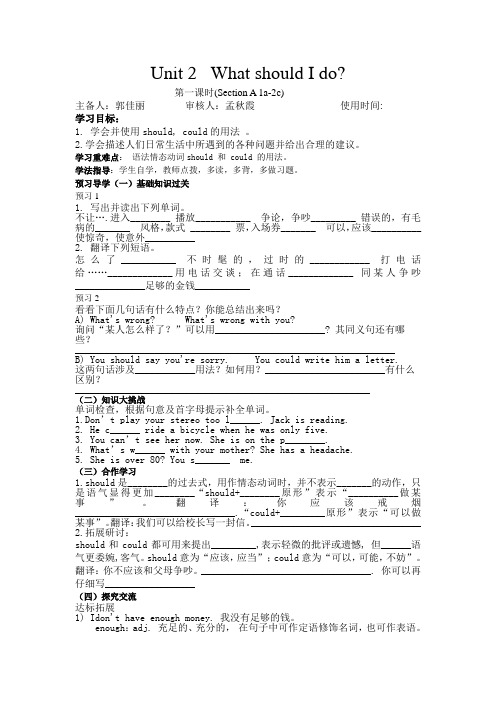
Unit 2What should I do?第一课时(Section A 1a-2c)主备人:郭佳丽审核人:孟秋霞使用时间:学习目标:1.学会并使用should, could的用法。
2.学会描述人们日常生活中所遇到的各种问题并给出合理的建议。
学习重难点:语法情态动词should 和 could 的用法。
学法指导:学生自学,教师点拨,多读,多背,多做习题。
预习导学(一)基础知识过关预习11. 写出并读出下列单词。
不让….进入________ 播放___________ 争论,争吵_________ 错误的,有毛病的_______ 风格,款式 ________ 票,入场券_______ 可以,应该__________ 使惊奇,使意外__________2. 翻译下列短语。
怎么了___________ 不时髦的,过时的____________ 打电话给……_____________用电话交谈;在通话_____________ 同某人争吵______________足够的金钱___________预习2看看下面几句话有什么特点?你能总结出来吗?A) What's wrong? What's wrong with you?询问“某人怎么样了?”可以用______________________? 其同义句还有哪些?________________________________________________________________B) You should say you're sorry. You could write him a letter.这两句话涉及____________用法?如何用?________________________有什么区别?___________________________________________________________(二)知识大挑战单词检查,根据句意及首字母提示补全单词。
人教版初中八年级英语下册第二单元Unit 2 教案含教学反思
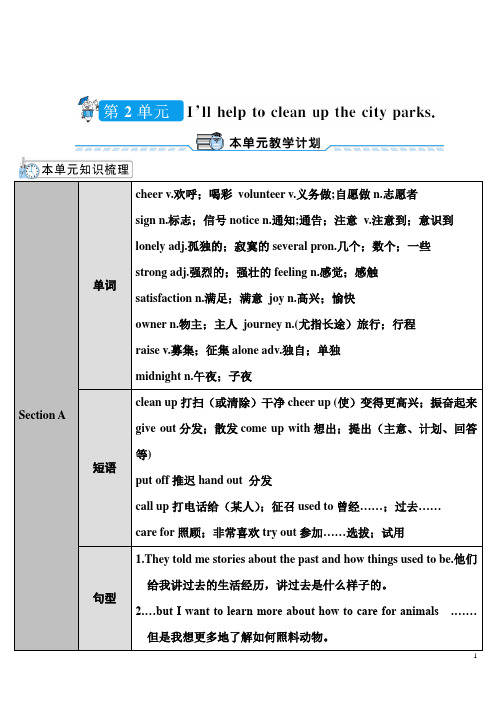
Section A 单词cheer v.欢呼;喝彩volunteer v.义务做;自愿做n.志愿者sign n.标志;信号notice n.通知;通告;注意v.注意到;意识到lonely adj.孤独的;寂寞的several pron.几个;数个;一些strong adj.强烈的;强壮的feeling n.感觉;感触satisfaction n.满足;满意joy n.髙兴;愉快owner n.物主;主人journey n.(尤指长途)旅行;行程raise v.募集;征集alone adv.独自;单独midnight n.午夜;子夜短语clean up打扫(或清除)干净cheer up (使)变得更高兴;振奋起来give out分发;散发come up with想出;提出(主意、计划、回答等)put off推迟hand out 分发call up打电话给(某人);征召used to曾经……;过去……care for照顾;非常喜欢try out参加……选拔;试用句型1.They told me stories about the past and how things used to be.他们给我讲过去的生活经历,讲过去是什么样子的。
2.…but I want to learn more about how to care for animals.……但是我想更多地了解如何照料动物。
句型1.I’m sure you know that this group was set up to help disabled people like me.我确定你知道这个团体是为了帮助像我这样的残疾人而建立的。
2.You helped to make it possible for me to have Lucky.有了你的帮助,我才有可能拥有“幸运儿”。
3.I’ll send you a photo of him if you like,and I could show you how he helps me.如果你喜欢,我会把它的一张照片寄给你,并可以让你看看它是怎样帮助我的。
八年级英语下册第二单元课件(全单元)
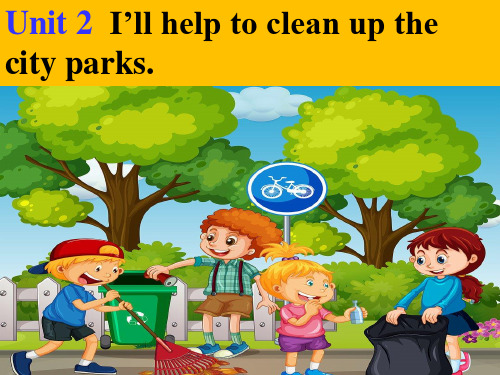
预习成果检测:
帮助摆脱饥饿 help stop hunger 使振奋起来 cheer up 分发 give out 食物库 food bank 教孩子 teach kids 课外学习项目 after-school study program
Let’s be volunteers!
What volunteer jobs do you know?
A group of students are planning a City Park
2a Clean-Up Day. Listen and check (√)the things they
are going to do to tell people about it.
√
√
√
2b Listen again. Fill in the blanks.
3.What can we do to help the old people? We can read newspaper to them, or just talk to them.
4. Do you think we have to care for the olds? Why or why not?
1. We need to___c_o_m__e _u__p__w_i_th_____ a plan to tell people
about the city park clean-up.
2.Clean-Up Day is only two weeks from now. We can’t
____p_u_t_ __o_f_f___ making a plan. 3.We could ____p_u_t_ _u__p____ signs.
人教版初中八年级英语下册第二单元同步练习题 知识点总结 专题训练

Unit 2I'll help to clean up the city parks.第一课时Section A(1a~2d)1.lonely的与alone辨析(1)lonely作形容词,意为“寂寞的”,侧重于主观上感到孤独、寂寞,有较浓的感情色彩,在句中作表语或定语。
作定语修饰表示地点的名词时,意为“荒凉的;偏僻的”。
如:He has a lonely life with few friends.他生活孤独,朋友很少。
(2)alone作形容词,意为“单独的;独自的”,强调独自一人,表示客观情况,常位于系动词后作表语。
alone 还可用作副词,意为“单独;独自”,修饰动词时,放在动词后面作状语。
如:He was all alone in the middle of the hall.他独自一人在大厅中间。
He came alone.他独自一人来了。
2.“动词+副词”型短语“动词+副词”构成的动词短语后接宾语若为代词,应置于动词和副词之间;宾语若为名词,可置于动词和副词之间,也可置于副词之后。
如:clean up打扫(或清除)干净cheer up (使)变得更高兴;振奋起来put up张贴give/hand out分发;散发3.put off的用法put off意为“推迟”,其后常接名词、代词或动名词。
如:We put off having the sports meeting because of the heavy rain.因为这场大雨,我们将运动会推迟了。
4.come up with的用法come up with意为“提出;想出”,宾语通常是idea,plan,way,solution 等。
如:He came up with a good idea to solve the problem.他想出了一个好方法来解决这个问题。
【拓展】come up with还有“赶上;追上”的意思,宾语通常是人。
- 1、下载文档前请自行甄别文档内容的完整性,平台不提供额外的编辑、内容补充、找答案等附加服务。
- 2、"仅部分预览"的文档,不可在线预览部分如存在完整性等问题,可反馈申请退款(可完整预览的文档不适用该条件!)。
- 3、如文档侵犯您的权益,请联系客服反馈,我们会尽快为您处理(人工客服工作时间:9:00-18:30)。
6. 当她看到孩子们脸上愉快的表情时,他得到一种强烈的满足感。 She got a strong ________ _________ ________ when she saw the________ _______ _______ on the children’s faces. 7 你可以跟他谈谈,帮他走出目前的困境。 You can _________ him by ________ with him.
学
活
动
课前、课 中反思
I V. 选择所给短语填空
hand out, put off, call up, come up with, put up 2. We could each 1.We need to ______________a plan to tell people about it . ________10 students and ask them to come. 3. There we ___________________ our tents and made a fire to keep us warm. 4. How heavily it is raining! We have to __________________ our sports meeting.
3.Tom got here at 9 yesterday morning and Dave did, too. (同义句) Tom and Dave got here _________ _________ _________ _________yesterday morning 4.They wondered where they could find the lost tickets.( 同义句) They wondered ______ _______ ______ the lost tickets. 5.Alice tried her best to make the sick children happy. (同义句) Alice tries he best ______ ______the sick children _____. 6. Her little brother is old enough to do it alone. (同义句) Her little brother is old enough to do it __________ ___________. ⅤII. 根据汉语提示完成句子 1.They are 2.He 3They (募捐)for the students in Lushan earthquake. (志愿帮助)old people . (有困难)climbing the mountain.
Most people today are only _______about getting good jobs to make lots of money. In their free time, they think about what _____for fun or relaxation. However, few people think about what they can do ______ others. There are many people who are less lucky than us. ________our time to help these people is good way ______ our free time. For example, we can make plans ____ sick children in the hospital or raise money for homeless people. Some people even stop doing their jobs for a few months or a year ______ to another country, like Africa, and help people there. VI. 句型转换 1.I used to swim in the river.( 改为否定句) I________ _________ ___________swim in the river. 2.The poor boy left home when he was ten years old.( 同义句) The poor boy left home ____ ____ _____ _____10.
编写时间 2014.5 执行时间
2014.5 主备人
执教者
总序第 49
个教案
课题
Unit2
I’ll help to clean up the city parks. 检测题
共 第
2 2
课时 课时
课型
新授
教学 检查同学们对本单元知识的掌握程度。 目标 重点 对所学知识的运用。 难点 教学 策略 教
III. 用所给词的 适当形式填空: 1.We should try to help those _________(able) people who have difficulties in their daily life. 2.The man would like to have a special _______(train ) dog. 3.A friend of ______(I) said that she would like to help him. 4.All of us should help those __________(home) poor people that have no place to live in. 5.I want to thank you for your _____________(kind) to me. 6.It makes a big ______________(different)to my life. 7.It’s a wonderful _________(feel) to be back home again 8.We finished doing our homework by _________(we). 9.The man has trouble _______(answer) the telephone. 10.The little girl felt _____(excite) when she saw her mother 11. I often hear the girl _______________(play) the violin in the next room. 12. Please tell the boys to stop _______________(make) noise. We’re having a meeting. 14. Do you have trouble___________(organize) the English evening? 15. Could you tell where _______(go )tomorrow? .
5. Let’s make some notices, too. Then I’ll _____________ them ___________ after school. V 用表格中所给动词的适当形式填空 help, move, do, , visit, spend, ,volunteer, worry
8. 网络使我们在家里购物成为可能。 The Internet ________ _____ _________ for us to buy things at home. III. 任务型阅读 Dogs like living with people. They are very friendly. They can do many things for people. Some dogs help people to look after sheep, other dogs help them to find the lost children.(1) And some of the dogs can help the blind.( 盲人) There is a kind of dog whose name is Seeing Eye Dog(2). Now we can see this kind of dog all over the world. They are working for the blind. The Seeing Eye Dog is strong and easy to train( 训练). He helps the blind to walk from place to place. Before a dog becomes a Seeing Eye Dog, he must be in a training school for about three months. First the dog has to learn to sit or stay when he hears the trainer’s call. In his next lesson the dog learns to take his trainer across busy streets (3). The dog has many things to learn. 在……的末尾(4)the training, he must take tests. When he passes the tests, the Seeing Eye Dog will do things by himself. Now he can help the blind people. The new master( 主人) may be a man , a woman or even a child. It takes the dog and his blind master about a month learning to work and live together. (5) 1. 在(2)处,Seeing Eye Dog means ______________ in Chinese. 2. 将(1) 处画线词组译成中文__________________ 3. 将(4)处画线中文词语译成英语_____________________________________ 4. 对(3)处画线部分提问_______ ________ the dog ______ ________ _______in his next lesson ? 5. 找出(5)句中的错误并改正,然后用 spend 做谓语改写句子 _________________________
